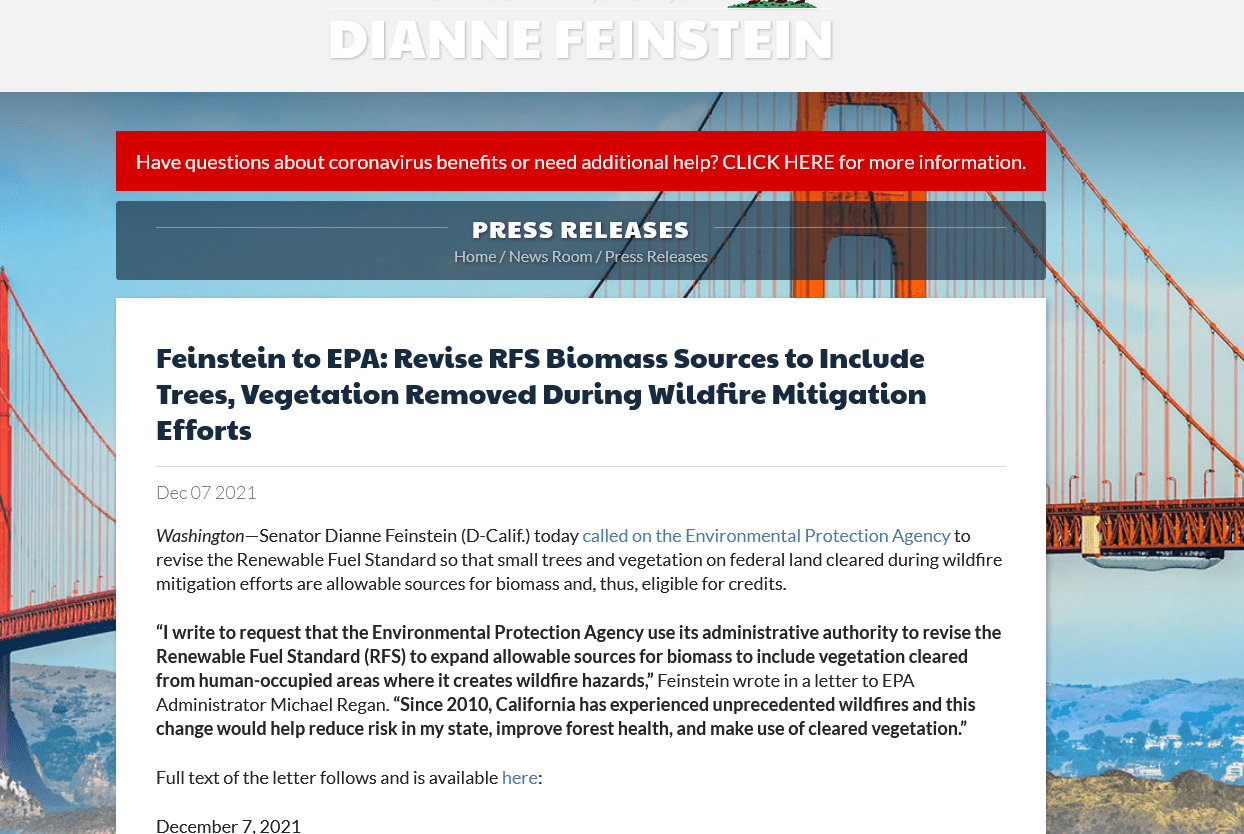It’s been interesting to watch the mechanics of how an issue becomes partisanized.. or departisanized. Two cheery notes on this wherein what used to be considered that bad R people had are now the same ideas that good D people from states like California and Colorado have.
At a alumni gathering a few years ago at Yale, Gina McCarthy gave what amounted to a rousing very partisan political speech (personally that’s not why I show up for reunions, but that’s a different topic) that included the concept of biomass being bad for climate as if it were something everyone knows the “right answer” to.
Fast forward a few years and here’s Senator Feinstein saying what we’ve always said here- it depends.. Don’t look at our problems through an “east coastal” lens.
“I write to request that the Environmental Protection Agency use its administrative authority to revise the Renewable Fuel Standard (RFS) to expand allowable sources for biomass to include vegetation cleared from human-occupied areas where it creates wildfire hazards,” Feinstein wrote in a letter to EPA Administrator Michael Regan. “Since 2010, California has experienced unprecedented wildfires and this change would help reduce risk in my state, improve forest health, and make use of cleared vegetation.”
Here’s what her letter said:
As you may know, Section 201 of the Energy Independence and Security Act of 2007 (EISA) allows biomass from federal land to be sourced “from the immediate vicinity of buildings and other areas regularly occupied by people, or of public infrastructure, at risk from wildfire.” In 2010, the EPA published implementation guidelines for that category in its final rule, “Regulation of Fuels and Fuel Additives: Changes to the Renewable Fuel Standard Program.” Unfortunately, the implementation of this law did not account for areas with wildfire hazard potential and excluded most of the Western United States where catastrophic wildfires are increasing common. (See attached map, “2020 U.S. Forest Service Wildfire Hazard Potential,” which underscores the risk in the West.)
As this year’s fuel quantities become finalized, I urge the EPA, in conjunction with federal land management agencies, to expand the criteria for which qualifying biomass could be sourced and, thus, eligible for credits under the cellulosic category in the RFS. This determination should be made in accordance with the latest science, and to recognize the exacerbating threat that climate change poses to catastrophic wildfire in the American West.
This one from the formerly “fuel treatments don’t work” Los Angeles Times.. (this is from a political reporter, not an environmental reporter, so..)
Democrats are proposing a potentially seismic shift in how the nation battles wildfires by dramatically increasing funding for efforts that aim to prevent blazes, rather than focusing on the tools to put them out.
Under the social safety-net and climate bill passed by the House and now being negotiated in the Senate, Democrats would funnel $27 billion into the nation’s forests, including a sizable $14 billion over a decade for clearing vegetation and other dry debris that can fuel a fire.
What this article seems to overlook is that there is a substantial chunk of change in the bipartisan Infrastructure bill, and that the BBB $ come with restrictions that may make them less useful than they could be.
Still, the $27 billion would represent the largest investment the federal government has made in its forests, according to Sen. Michael Bennet (D-Colo.), who introduced a similar forestry bill this year. Funding for the preventative hazardous fuels reduction — to be spread over a decade — is more than double what Congress spent on such efforts annually between 2011 and 2020, according to the nonpartisan Congressional Research Service.
Traditionally, the federal government has focused its wildfire spending on suppression at the expense of prevention. The Interior Department and Forest Service are even allowed to unilaterally move money from any of its programs, including fire prevention, to fund more urgent suppression efforts.
“When you combine the effects of climate change with the profound negligence of the federal government in terms of managing its national forests, these places are profound dangers to our communities and to our economy,” Bennet said.
“Profound negligence of the federal government in terms of managing its national forests”.. sounds almost like an R Congressperson from the Sierra, or dare I say, the Western Slope.

One thing everyone seems to agree on is that the Forest Service has mismanaged the national forests. Has Bennet said anything more about what he means by that – what he thinks they did wrong or should have been doing that they didn’t? I’m guessing he wouldn’t be agreeing with Senator Daines (for example) on what bad management is.